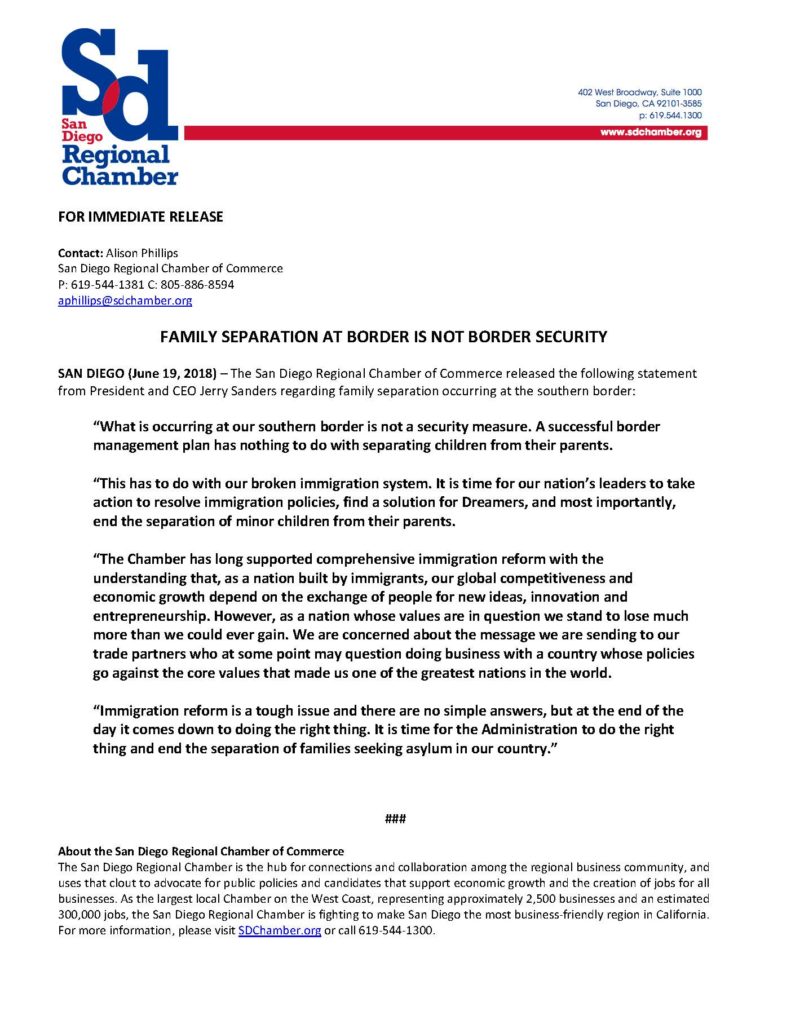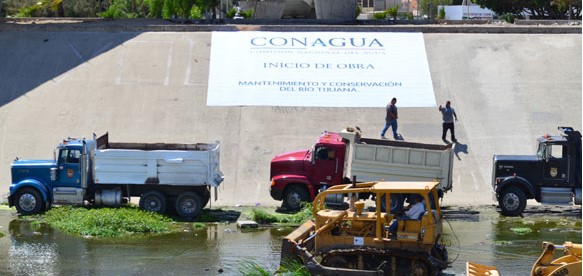July 13, 2018
Last month, the Chamber issued a statement regarding family separation occurring at the southern border, stating the policy’s negative impact on our credibility as a nation and commercial partner.

July 13, 2018
Last month, the Chamber issued a statement regarding family separation occurring at the southern border, stating the policy’s negative impact on our credibility as a nation and commercial partner.

July 13, 2018
The Chamber’s IBA Committee and regional stakeholders met with Ambassador Anthony Wayne to learn about a project he is leading with the Wilson Center in Washington D.C. on promoting North American cooperation on issues pertaining to workforce development. Ambassador Wayne provided an overview of a report which included policy proposals and highlighted the need for regional collaboration to generate more jobs, boost the productive power, and strengthen the global competitiveness of the North American region.
The report recommends action and policy updates on the following areas:
The successful implementation of the proposed North American Workforce Development Agenda depends on joint collaboration and multi-stakeholder involvement, including the three levels of government, business community, educational institutions, unions, NGOs and civil society from all three countries.
To read the full report, please visit the Wilson Center’s website here.
July 13, 2018
Aiming to minimize pollution on the Tijuana River Channel, Tijuana Councilmember Ivette Casillas created a program to clean up a large section of excessive mounds of plastic, sediment, debris, and waste contained in the channel. Under her leadership, other organizations joined forces including the National Water Commission (CONAGUA), the National Migration Institute (INM), and the Human Rights Office (Procuraduria Derechos Humanos). Councilmember Casillas guided efforts and allocated resources to diminish plastic waste that ends up across the border on the U.S. side.
The cleanup area started at the U.S.-Mexico border and extended one kilometer (0.6 miles) south. In addition to collecting waste, volunteers assisted in the relocation of homeless people residing in the channel and painted colorful murals on the Mexican side of the border wall.
Other resources included:

The project removed 380㎥ of sediment and debris. The City of Tijuana and other agencies continue working together on similar projects as well as efforts to prevent debris and waste from entering the channel.
Earlier this year, CONAGUA announced the investment of $80 million pesos ($4.3M USD) for improvements to repair Tijuana’s sewage infrastructure and minimize transboundary pollution. This project is designed to replace sewage pipelines and the main wastewater treatment plant to prevent sewage spills along the canal. In collaboration with the state’s public utility commission (CESPT), the project will continue to clean up the remaining 13 kilometers of the canal.
July 13, 2018
The recently imposed U.S. tariffs on steel and aluminum imports as well as a group of products from China have prompted retaliatory action from Europ, Canada, Mexico, and China. This trade war has already resulted in higher costs for U.S. companies which rely on steel and aluminum inputs and job losses across industries whose exports now face retaliatory tariffs.
The Chamber, along with business organizations across the country, oppose tariffs as they are a tax on business and consumers. Past use of tariffs to protect specific industries, proved to be counterproductive resulting in increased cost of living, a drop in U.S. exports, a decrease in production and loss of jobs. The best way to aid domestic industries and increase access to foreign markets is through trade agreements.
This understanding has driven our advocacy for free trade. We have signed on to a letter in support of S. 3013, a bi-partisan bill sponsored by Sen. Corker and others that would require the President to submit to Congress any proposals to raise tariffs in the interest of national security under the Trade Expansion Act of 1962. The letter was sent to members of the U.S. Senate, sharing the concern of more than 270 industry trade associations, local chambers of commerce, and other business organizations on the retaliatory tariffs from our largest trading partners and closest allies, which will have serious negative economic impacts nationwide and diminish our global competitiveness. This effort was highlighted in an exclusive story by USA Today.
The U.S. Chamber of Commerce conducted a state by state analysis of the impacts on U.S. exports. The analysis includes the list of California exports which will now face greater competition in foreign markets. In total, there are $562 million worth of California exports to Canada which will now face tariffs, $699 million in exports to Mexico, $4 billion in exports to China, and $383M in exports to Europe. The impact is significant as 4,869,200 California jobs are supported by global trade.
The Chamber will be sending an additional letter opposing tariffs on imports to the administration and Congress. To support this effort and add your name to this letter, please email Kenia Zamarripa.
July 13, 2018
Mexican general elections took place July 1st. It was a historic election due to the high number of seats on the ballot: voters elected all 500 members of the House known as the Chamber of Deputies, 128 members of the Senate, and a new president. Elected members of the legislature will be the first ever allowed to run for re-election in Mexico. Local elections also took place in 30 out of 32 Mexican states.
With over 50 percent of vote and winning majority in 31 of 32 states, candidate Andres Manuel Lopez Obrador from the MORENA party was elected President of Mexico. He will take office on December 1st, 2018 for a term of six years. In addition, MORENA will be a majority on the Chamber of Deputies and the Mexican Senate.

Lopez Obrador met with President Enrique Peña Nieto to coordinate an orderly and smooth transition, discussing agenda priorities such as NAFTA, national security, and the energy and education reforms that took place during Peña Nieto’s administration.
A day after the election, President Trump called Lopez Obrador to congratulate him and express support to his administration. During the 30-minute conversation, they briefly shared views on immigration, national security, and the possibility of a bilateral agreement that could substitute NAFTA.
The Chamber sent Lopez Obrador a congratulatory letter reaffirming our desire and commitment to continue working together as we have with past administrations to develop and promote projects and initiatives that improve our economies such as border infrastructure and trade facilitation; workforce development and minimizing transboundary pollution.
We are also reaching out to the newly elected members of the Mexican Congress as well as the members of Lopez Obrador’s proposed cabinet to foster relationships in advance of the Chamber’s 14th delegation trip to Mexico City taking place March 31 to April 3, 2019.
July 12, 2018
The Veterans Honor Roll program was launched to encourage the hiring of veterans in the San Diego region and recognizes Chamber members who have a commitment to veteran employment. If your business has hired at least one veteran in the past 90 days, you are eligible to become a member of the Honor Roll. Click here for more information.
July 12, 2018
Are you a growing, San Diego-based company? Are you looking to expand into foreign markets? Or, are you a defense contractor looking to diversify revenue? The San Diego Regional EDC can help. Apply now to EDC’s business support programs – MetroConnect and/or the Defense Innovation Voucher Program – which offer $10K-$15K grants and programmatic services to support your business’ growth.
July 12, 2018
The City of San Diego is preparing a new five-year Consolidated Plan (Fiscal Years 2020-2024) to identify community needs and priorities. The public is invited to share thoughts and suggestions at a series of upcoming community forums to be held throughout the City of San Diego in July and August 2018. If you’d like to contribute but cannot attend a meeting, you can share your thoughts and suggestions via survey.
July 12, 2018
SANDAG presented their Regional Growth Forecast to the Chamber’s Public Policy Committee on July 10th and the Healthcare Committee on July 11th. There is expected to be continued population growth in the San Diego region, particularly in the elderly population. This growing older population will have a significant impact on the housing market, as this portion of the population often has smaller household sizes. Additionally, the presentation stressed the importance of the housing needed to accommodate our regional growth, which is one of the Chamber’s priorities.
July 12, 2018
As San Diego grapples with a growing housing crisis, a disconnect exists between where jobs are expected to be and where housing can be built. And, employer satisfaction regarding the housing supply has sunk to a new low. These are the key findings of a study released June 26 by the San Diego Regional Chamber of Commerce, which updates a 2016 study authored by London Moeder Advisors. The San Diego County Housing Study & Economic Impact Analysis projects specific housing-type shortages in North County, where there is a substantial imbalance of housing and jobs, and includes a survey of employers’ views on how the lack of reasonably priced housing is affecting talent attraction efforts.